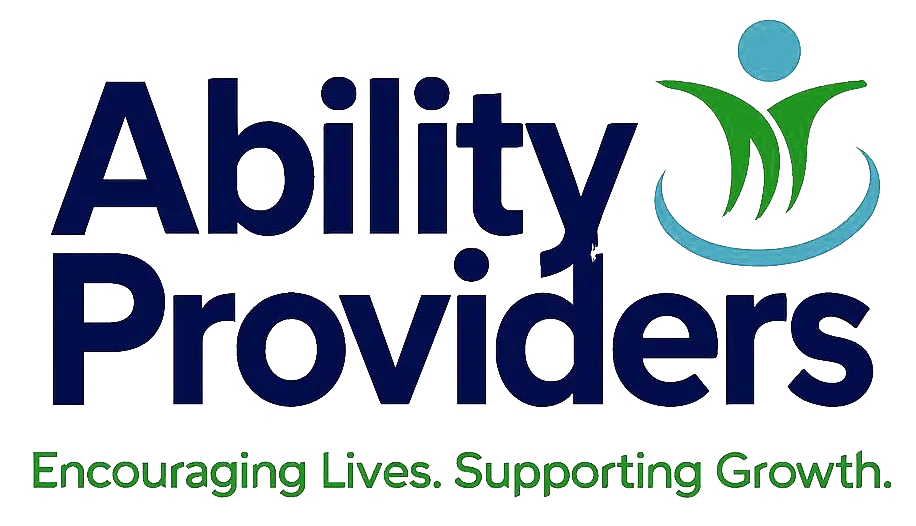Encouraging
Lives.
Supporting Growth.
250+
Families supported each year
All Ages
Children, Teens, & Adults
Get Involved: Volunteer, Refer, or Donate.
think about your future
Together, We Create Abilities.
Ability Providers is committed to enhancing the quality of life for individuals with developmental disabilities and their families through enrichment, training, and support.
85 %
Increased Independence
Participants reporting increased independence.
20 +
Our team
Dedicated professionals on our team.


Independent Living Skills
Helping individuals build everyday skills such as cooking, budgeting, personal care, and decision-making to live more independently with confidence.

Adaptive Skills Training
Personalized training designed to improve communication, social interaction, and problem-solving skills, tailored to each individual’s needs.

Parent & Family Support
Guidance and training for parents and families to better understand, support, and advocate for their loved ones in daily life and community settings.

Supportive Living Services
We promote independence and self-sufficiency, empowering individuals to choose the support they need for personal and community living.
Lend a hand. Change a life.
Join the Mission
Make a Difference
Be part of something bigger.
Help individuals with developmental disabilities live more fulfilling lives while positively impacting your community.
Grow With Us
Personal and professional growth.
As you support others in reaching their goals, you’ll gain valuable skills, confidence, and lifelong connections.
Flexible Work Hours
Work that fits your life.
Enjoy the freedom to balance your career with your personal life through flexible scheduling options.
Competitive Pay
Rewarding work, rewarding pay.
Earn attractive hourly rates while doing meaningful work that truly changes lives.

Empowering Abilities, Transforming Lives
Support Independence
What is Developmental Disability?
A developmental disability is a disability that originates before an individual attains age 18 years, continues, or can be expected to continue, indefinitely, and constitutes a substantial disability for that individual.
A "substantial disability" means the existence of significant functional limitations in three or more of the following areas of major life activity, as determined by a regional center, and as appropriate to the age of the person:
- Self-care
- Receptive and expressive language
- Learning
- Mobility
- Self-direction
- Capacity for independent living
- Economic self-sufficiency
Autistic Disorder
People with autistic disorder usually have significant language delays, social and communication challenges, and unusual behaviors and interests. Many people with autistic disorder also have intellectual disability. Autistic disorder is present before the age of 3 and lasts throughout a person's life, although symptoms may improve over time.
Cerebral Palsy
Cerebral palsy refers to a group of disorders that affect a person’s ability to move and to maintain balance and posture. It is due to a non-progressive brain abnormality, which means that it does not get worse over time, though the exact symptoms can change over a person’s lifetime. People with cerebral palsy have damage to the part of the brain.
Epilepsy
Epilepsy, sometimes referred to as seizure disorder, is a general term that refers to a tendency to have recurrent seizures. There are many kinds of seizures, but all involve abnormal electrical activity in the brain that causes an involuntary change in body movement of function, sensation, awareness, or behavior. Symptoms can vary.
Intellectual Disability (Mental Retardation)
Intellectual disability is characterized both by a significantly below-average score on a test of mental ability or intelligence and by limitations in the ability to function in areas of daily life, such as communication, self-care, and getting along in social situations and school activities. Intellectual disability is sometimes referred to as cognitive disability.
Making an Impact Every Day
Empowering Hundreds of Families Across Communities.
We’re proud to support individuals with developmental disabilities and their families through compassionate care, training, and enrichment. With a growing network of dedicated staff and volunteers, our impact continues to expand across communities.
